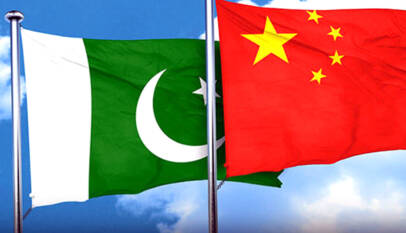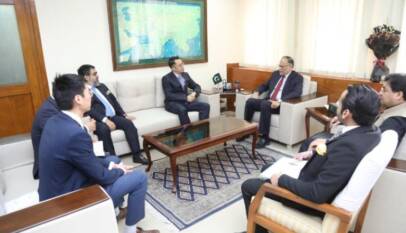Peshawar-Kabul Motorway to Pave way for Afghanistan to Join CPEC
The recent China-Afghanistan-Pakistan dialogue has seen a successful advancement in expansion of the China-Pakistan Economic Corridor. The Trilateral dialogue has agreed to construct Peshawar-Kabul Motorway, which is likely to be named as ‘China-Afghanistan-Pakistan Plus Cooperation’ (CAPPC). Analysts believe that Peshawar-Kabul motorway would lead to Afghanistan’s formal joining of CPEC. Besides road connectivity, landlocked Afghanistan would have access to Gwadar port which will resolve the trade issues of the country. Signing this Memorandum of Understanding (MoU) Afghanistan has become part of President Xi Jinping’s BRI vision along with other 165 countries.
ISLAMABAD: In a major breakthrough, China, Pakistan, and Afghanistan have agreed to expand road connectivity as the China-Pakistan Economic Corridor (CPEC) enters its second phase.
The agreement was made at the third round of the third Trilateral Dialogue between the three neighbours, where they agreed to the construction of the Peshawar-Kabul motorway.
Diplomatic sources told Pakistan Today that foreign ministers of the three countries discussed the future regional scenario as US forces plan their withdrawal from war-torn Afghanistan, observing that the Peshawar-Kabul motorway may provide the foundation for Afghanistan’s formal joining of the CPEC as Peshawar is already linked with the route.
“So when Kabul and Peshawar are linked through road, it would automatically connect Kabul to CPEC – the pilot project of a multi-continental connectivity project launched by China called the Belt and Road Initiative (BRI). The formal announcement may be made at some later stage,” the source added.
“The construction of this motorway would not only link Afghanistan with Pakistan and China, it would also link landlocked Afghanistan with Pakistan’s strategic port of Gwadar which would alleviate Kabul’s trade issues,” the source further said.
“However, due to some diplomatic hitches, the three friendly neighbours have decided that the motorway would be named ‘China-Afghanistan-Pakistan Plus Cooperation’ (CAPPC). The initiative aims at jointly working towards promoting trade and connectivity projects between the three countries,” the sources stated, adding that a document was also signed at the moot.
It merits mention here that CPEC is being constructed in Pakistan under a mega investment initiative of around $62 billion by China. Out of the total portfolio, projects worth $20 billion have already been completed while the remaining projects are being executed.
BRI was launched by Chinese President Xi Jinping in late 2013. Since then, around 165 countries and international organisations have joined the initiative while 86 countries, including Afghanistan, have signed a Memorandum of Understanding (MoU) with China so far.
It is self-evident that the BRI mega project carries much significance for Afghanistan, which intends to regain its historical position as an “Asian transit and trade roundabout” connecting South Asia to Central Asia, and East Asia to West Asia.
Afghanistan also became a permanent member of the Asian Infrastructure Investment Bank (AIIB) in 2017.
“It seems that Afghan President Dr Ashraf Ghani has a change of heart on joining the CPEC. China had initially floated the idea to include Afghanistan into CPEC in 2017 but Dr Ghani was reluctant so he did not take up the offer,” the diplomatic source said.
The source revealed that the offer was again put forth in the second Trilateral Dialogue held in 2018 but Kabul regime did not respond. China had also hinted on the offer publicly when Chinese Ambassador Yao Jing in November 2018 had said that Kabul can also act as a bridge to help expand connectivity between east, south and central Asian regions.
“Under the BRI, China wants peaceful development of all its neighbours and would take all necessary measures to achieve peaceful development in Afghanistan,” the source quoted Yao.
Further, the Joint Declaration issued after the third Trilateral Dialogue in Islamabad again hinted on the development.
“The three sides reaffirmed their commitment to further strengthening their relations, exploring new ways of deepening cooperation, including advancing connectivity under the Belt and Road Initiative (BRI), Regional Economic Cooperation Conference on Afghanistan (RECCA) and other regional economic initiatives,” the declaation stated.
“The three sides welcomed the progress made on implementation of projects agreed under the China-Afghanistan-Pakistan Practical Cooperation Dialogue (CAPPCD). They agreed to continue cooperation in the fields of economic development, capacity building, improving livelihood and people-to-people exchanges,” the declaration added.
Another important development includes the decision to jointly wage counter terrorism operations against terrorist forces present inside Afghanistan and bordering areas including Islamic State (Da’ish), Tehreek-e-Taliban Pakistan (TTP) and East Turkestan Islamic Movement (ETIM).
Pakistan, China to hold key talks in Beijing on May 15
Pakistan and China will hold important strategic talks in Beijing on May 15. Deputy Prime …












